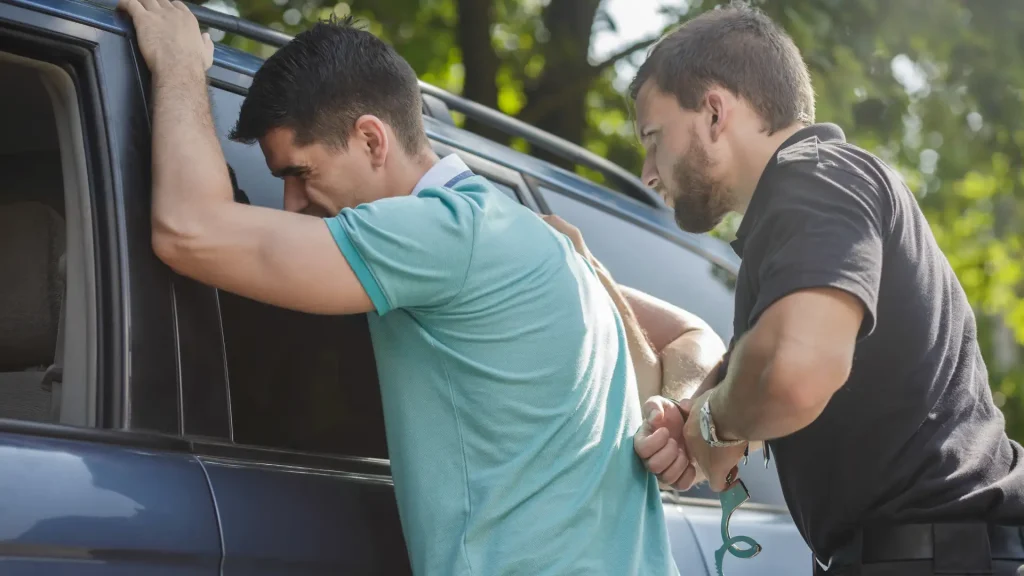Is a DWI a felony in Texas? The answer depends on specific circumstances surrounding your case. These include prior convictions, aggravating factors, and whether anyone was injured. Most first-time DWI offenses in Texas are classified as misdemeanors. However, certain situations can elevate these charges to felony level.
Felony DWI charges carry severe penalties. These include years in prison, substantial fines, and long-lasting consequences for your future. Understanding when DWI charges become felonies helps protect your rights and freedom. Additionally, knowing your defense options can make a critical difference in your case.
When Does a DWI Become a Felony in Texas?
Under Texas Penal Code Chapter 49, driving while intoxicated typically begins as a Class B misdemeanor for first-time offenders. However, Texas law recognizes four specific scenarios that automatically elevate DWI charges to felony status. Each scenario carries significantly harsher penalties than standard misdemeanor DWI.
The four circumstances that transform a DWI into a felony include:
- A third or subsequent DWI offense
- Driving while intoxicated with a child passenger under 15 years old
- Intoxication assault (causing serious bodily injury)
- Intoxication manslaughter (causing death)
Each of these scenarios carries distinct legal classifications and penalty ranges. Furthermore, these classifications can dramatically impact your future. Understanding these distinctions becomes crucial when facing DWI charges. The difference between misdemeanor and felony classifications affects immediate penalties and long-term consequences. These consequences include employment opportunities, professional licensing, housing applications, and civil rights.
Third Offense DWI: Automatic Felony Enhancement
Texas felony DWI laws treat a third DWI offense as a third-degree felony. This applies regardless of how much time has passed between convictions. This enhancement applies even if your blood alcohol concentration barely exceeded the legal limit of 0.08%. Prior DWI convictions from other states count toward this enhancement. Therefore, understanding your complete driving history becomes important when facing charges.
A third-degree felony DWI carries penalties of two to ten years in prison and fines up to $10,000. Additionally, you face driver’s license suspension for 180 days to two years. Other consequences include mandatory installation of an ignition interlock device and potential community service requirements. The felony conviction creates a permanent criminal record that cannot be sealed or expunged.
Recent case results from My Dallas Criminal Lawyer demonstrate that repeat DWI offender laws can be successfully challenged. Our firm has achieved favorable outcomes by examining the validity of prior convictions. We also challenge the admissibility of evidence and identify procedural errors that may have occurred during previous cases.
DWI with Child Passenger Under 15
Driving while intoxicated with a child passenger under 15 years old constitutes a state jail felony under Texas law. This applies even for first-time offenders. This enhancement reflects the state’s commitment to protecting children from the dangers of impaired driving. The penalties include 180 days to two years in state jail, plus fines up to $10,000.
The presence of a child passenger under 15 transforms what would otherwise be a misdemeanor into a felony charge. This applies regardless of your prior driving record. This enhancement applies whether the child is your own, a relative, or any minor under your care. The prosecution must prove both intoxication and the presence of the child passenger to secure a conviction under this statute.
Defense strategies for DWI with child passenger felony charges often focus on challenging the evidence of intoxication. We also question the accuracy of field sobriety tests and examine whether proper procedures were followed during the arrest. Our criminal defense attorneys have successfully defended clients by demonstrating that blood alcohol testing was conducted improperly. We also show when constitutional violations occurred during the traffic stop.
Intoxication Assault: When DWI Causes Serious Injury
Intoxication assault occurs when someone operating a vehicle while intoxicated causes serious bodily injury to another person. This third-degree felony carries penalties of two to ten years in prison and fines up to $10,000. The key element prosecutors must prove is that the defendant’s intoxication was the proximate cause of serious bodily injury to the victim.
Texas law defines “serious bodily injury” as injury that creates a substantial risk of death. It also includes injury that causes serious permanent disfigurement or protracted loss or impairment of bodily function. This definition covers a wide range of injuries. These range from broken bones requiring surgery to traumatic brain injuries with lasting effects.
Beyond criminal penalties, intoxication assault charges often trigger civil liability lawsuits from injured parties. These parties seek compensation for medical expenses, lost wages, and pain and suffering. The felony conviction can be used as evidence in civil proceedings. Therefore, effective criminal defense becomes crucial for protecting both your freedom and financial future.
Intoxication Manslaughter: The Most Serious DWI Felony

Intoxication manslaughter represents the most severe DWI-related charge in Texas. Courts classify this as a second-degree felony when someone’s intoxicated driving causes another person’s death. Penalties include two to twenty years in prison and fines up to $10,000. This makes intoxication manslaughter among the most serious criminal charges in the Texas Penal Code.
The prosecution must establish that the defendant was operating a vehicle while intoxicated. They must also prove that this intoxication was a proximate cause of the victim’s death. Unlike violent crimes charges, intoxication manslaughter does not require proof of intent to cause death. Instead, it focuses on the causal relationship between intoxication and the fatal outcome.
DWI causing death felony cases often involve complex accident reconstruction, medical testimony, and extensive investigation. Our firm’s experience includes successfully challenging the state’s evidence regarding causation and intoxication levels. This sometimes results in reduced charges or case dismissals.
Enhanced Penalties and Additional Consequences
Felony DWI convictions trigger enhanced penalties beyond standard criminal sanctions. Driver’s license suspensions for felony DWI typically range from 180 days to two years according to the Texas Department of Public Safety. Courts provide limited opportunities for occupational licenses. Ignition interlock device requirements may extend for years following conviction. These devices require monthly maintenance fees and compliance monitoring.
Professional licensing consequences affect attorneys, doctors, nurses, teachers, and other licensed professionals. These professionals may face disciplinary action or license suspension following felony convictions. Employment opportunities become limited as many employers conduct background checks. Many employers exclude applicants with felony records.
Immigration implications for non-citizens can be severe. Felony DWI convictions may trigger deportation proceedings or prevent naturalization applications. Housing applications often require disclosure of felony convictions. This limits rental opportunities and affects mortgage applications.
Defense Strategies for Felony DWI Charges
Effective defense against felony drunk driving charges requires comprehensive analysis of every aspect of your case. This includes everything from the initial traffic stop through evidence collection and testing procedures. Constitutional challenges to traffic stops focus on whether law enforcement had reasonable suspicion to initiate the stop. We also examine whether they had probable cause to make an arrest.
Field sobriety test reliability issues provide another avenue for defense. These tests can be affected by medical conditions, medications, fatigue, and environmental factors. Our attorneys examine the officer’s training, the testing conditions, and whether standardized procedures were properly followed during administration.
Blood and breath test accuracy challenges involve scrutinizing the chain of custody, testing equipment calibration, and laboratory procedures. We have successfully excluded BAC evidence by demonstrating that testing protocols were not followed. We also show when equipment malfunctioned during the testing process.
Frequently Asked Questions About Felony DWI in Texas
Can a first-time DWI be a felony in Texas?
Yes, a first-time DWI can be charged as a felony if you have a child passenger under 15 years old in the vehicle. Additionally, if your first DWI results in serious bodily injury (intoxication assault) or death (intoxication manslaughter), these charges carry felony classifications regardless of your prior record.
What happens if I refuse a breath or blood test?
Refusing a breath or blood test triggers Administrative License Revocation (ALR) proceedings. This results in automatic license suspension. You have 15 days from the date the suspension notice is served directly to you to request an ALR hearing. If the notice is mailed, you have 20 days to request a hearing to contest this suspension. Law enforcement may also obtain a warrant to draw your blood. This makes refusal less effective as a defense strategy.
How long do DWI convictions stay on my record?
Felony DWI convictions create permanent criminal records that cannot be expunged or sealed under Texas law. However, you may be eligible for an occupational driver’s license after serving a portion of your suspension period. This allows limited driving for work, school, or other needs.
Can felony DWI charges be reduced to misdemeanors?
Felony DWI charges can sometimes be reduced through plea negotiations. This depends on the specific circumstances of your case and the strength of the prosecution’s evidence. Factors affecting potential reductions include the accuracy of BAC testing and the validity of the traffic stop. We also examine whether proper procedures were followed during your arrest.
Let My Dallas Criminal Lawyer Represent Your DWI Case
My Dallas Criminal Lawyer provides experienced criminal defense representation throughout the Dallas-Fort Worth Metroplex. Founding attorney Justin Wilson brings valuable experience as a former prosecutor. He has been recognized as a Texas Rising Star by Super Lawyers from 2021-2023. The firm maintains a 5.0 Google rating and offers free consultations with 24/7 availability.
If you’re facing felony DWI charges in Texas, contact My Dallas Criminal Lawyer at 214-949-4117 for a free consultation. With offices in Dallas and Frisco, our experienced attorneys are ready to protect your rights and fight for your future.





